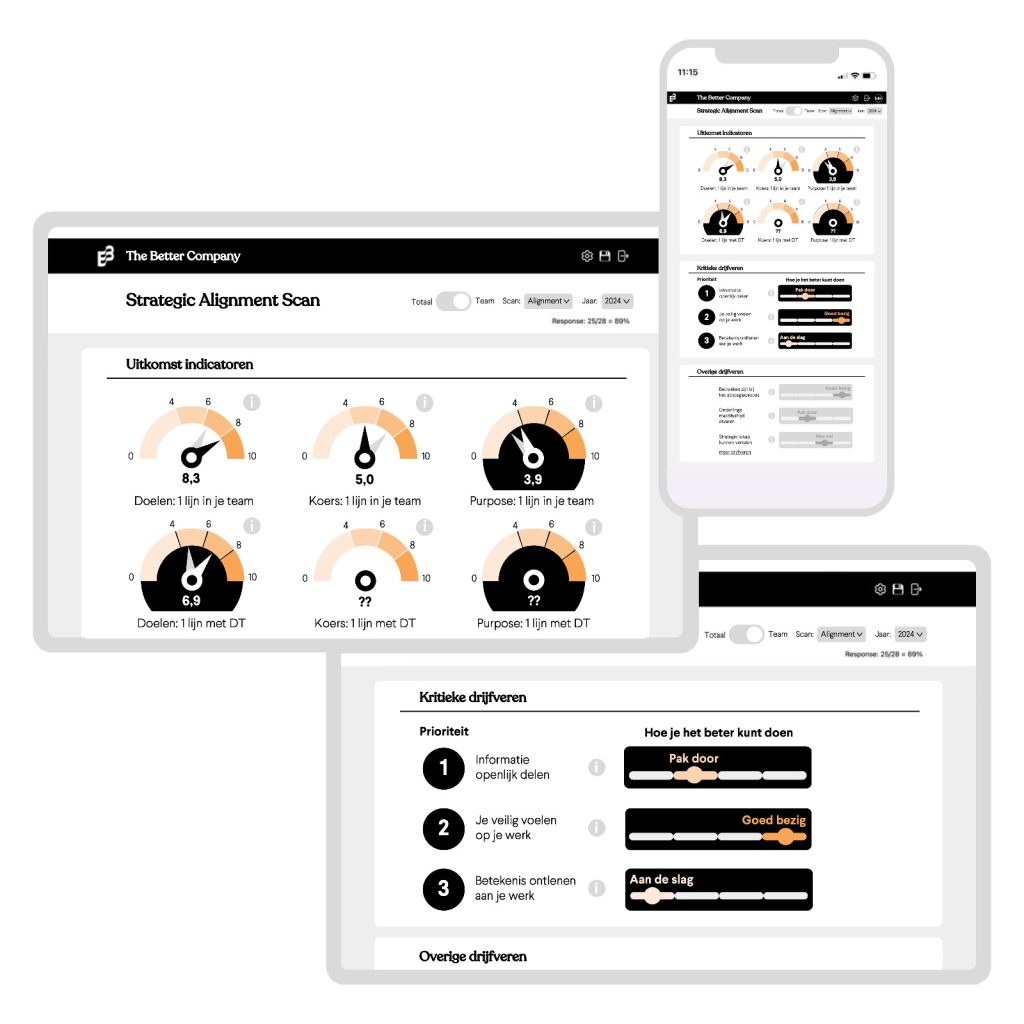Compile a validated questionnaire with scientific measurement scales
Using scientifically validated questionnaires not only increases the quality of your employee research, but also the reliability of the conclusions. This makes it possible to interpret trends properly, identify deviations and do effect analyses.
There is a validated measurement scale for each theme in your employee engagement survey
Validated measurement scales exist for measuring numerous themes within organizations. A validated measurement scale consists of a set of questions or statements designed to measure one or more theoretical constructs (such as engagement). Such a measurement scale is validated by empirical research that demonstrates that the scale actually measures what it claims to measure (construct validity) and does so consistently across different measurement times and samples (reliability). A validated measurement scale is therefore essential to gain accurate, reliable and repeatable insights from employees about your organization. The Better Company offers a library of over 150 validated questionnaires around a variety of topics.
Some sample topics from our scientific library
- All
- Learning
- Safety
- Job
- Engagement
- Inclusion
- Leadership
- Integrity
- Sustainability
- Alignment

Psychological safety
The degree to which team members feel safe to take interpersonal risks, such as asking questions, admitting mistakes and sharing ideas.
Source: Amy Edmonson (1999)

Team learning behavior
The extent to which teams collectively develop new knowledge, critically reflect on their practices and continuously improve.
Source: Amy Edmonson (1999)

Task characteristics
Subscale from the Work Design Quistionnaire that measures the extent to which tasks contain motivational characteristics, such as autonomy, variety, task importance, task identity and feedback.
Source: Morgeson & Humphrey (2006)

Social support
Subscale from the Work Design Quistionnaire that measures the extent to which colleagues and supervisors provide support, help and appreciation in the workplace.
Source: Morgeson & Humphrey (2006)

Engagement
The Utrecht Work Engagement Scale measures engagement at work through three dimensions: vitality, dedication and absorption.
Source: Schaufeli, W. B., Bakker, A., & Salanova, M. (2006)

PANAS
Watson, Clark & Tellegen’s (1988) Positive and Negative Affect Schedule (PANAS) measures positive and negative mood through 20 emotions.
Source: Watson, D., Clark, L. A., & Tellegen, A. (1988)

Inclusive leadership
Measure openness, accessibility and availability of leaders to strengthen inclusiveness and psychological safety within teams.
Source: Carmeli et al. (2010)

Employee voice
Measures the extent to which employees share ideas, concerns or suggestions to influence organizational improvement and decision-making.
Source: Morrison, E. W. (2011)

Organizational identification
Measure of the degree to which employees feel emotionally connected to and identify with their organization as part of their self-image.
Source: Mael and Ashforth (1992)

Behavioral integrity
Measurement scale that measures the extent to which employees perceive leaders’ behavior as consistent with their words and promises.
Source: Simons, T. (2002)

Ethical climate
Ethical climate refers to shared perceptions within an organization about what counts as proper behavior and how ethical issues are addressed.
Source: Victor, B., & Cullen, J. B. (1988)

Ethical leadership
Ethical leadership is about leaders demonstrating honest, fair and caring behavior, as well as encouraging it in others within the organization.
Source: Yukl (2010)
Customize your survey
A broad-based employee survey is usually not a “one-size-fits-all. After all, there are specific themes and roles in every organization. And you may want to add some proprietary or open-ended questions. Nevertheless, a number of themes often recur. With our platform, you can therefore easily create your customized scan. By using our library of validated measurement scales, you can be sure that you are measuring what you want to know.
We are a data-driven research firm. This makes it possible to gain additional insights from pre-existing, proprietary data on employee retention and absenteeism, for example. It is also possible to add open-ended questions to our surveys, we analyze the answers based on AI-driven sentiment analysis and usually provide a valuable addition to the findings and conclusions.

What to expect.
Here’s what you can expect when we execute a Do Better Scan:

Flawless survey operation
We provide a smooth and service-oriented online survey, in a way where you don't have to worry about anything.

Benchmarks
Find out how the survey outcome within your organization compares to outcomes at other organizations.

Crystal clear reports
You get crystal clear and fine-grained insight into metrics and drivers in a simple and easy-to-read dashboard.

Concrete follow-up advice
The reports indicate themes on which deepening and follow-up actions are desired.




